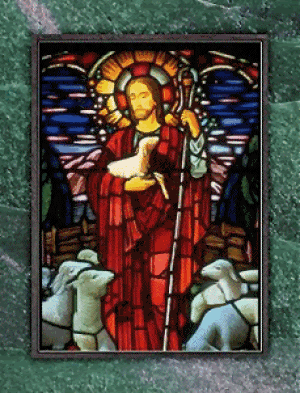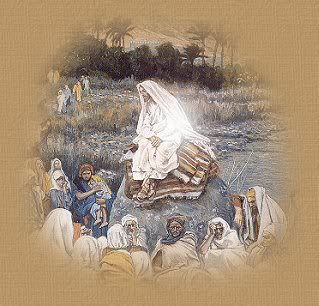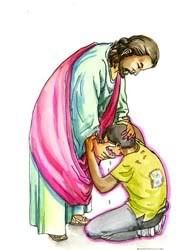Evangelium nach Lukas 16,19-31.
Es war einmal ein reicher Mann, der sich in Purpur und feines Leinen kleidete und Tag für Tag herrlich und in Freuden lebte. Vor der Tür des Reichen aber lag ein armer Mann namens Lazarus, dessen Leib voller Geschwüre war. Er hätte gern seinen Hunger mit dem gestillt, was vom Tisch des Reichen herunterfiel. Statt dessen kamen die Hunde und leckten an seinen Geschwüren. Als nun der Arme starb, wurde er von den Engeln in Abrahams Schoß getragen. Auch der Reiche starb und wurde begraben. In der Unterwelt, wo er qualvolle Schmerzen litt, blickte er auf und sah von weitem Abraham, und Lazarus in seinem Schoß. Da rief er: Vater Abraham, hab Erbarmen mit mir, und schick Lazarus zu mir; er soll wenigstens die Spitze seines Fingers ins Wasser tauchen und mir die Zunge kühlen, denn ich leide große Qual in diesem Feuer. Abraham erwiderte: Mein Kind, denk daran, daß du schon zu Lebzeiten deinen Anteil am Guten erhalten hast, Lazarus aber nur Schlechtes. Jetzt wird er dafür getröstet, du aber mußt leiden. Außerdem ist zwischen uns und euch ein tiefer, unüberwindlicher Abgrund, so daß niemand von hier zu euch oder von dort zu uns kommen kann, selbst wenn er wollte. Da sagte der Reiche: Dann bitte ich dich, Vater, schick ihn in das Haus meines Vaters! Denn ich habe noch fünf Brüder. Er soll sie warnen, damit nicht auch sie an diesen Ort der Qual kommen. Abraham aber sagte: Sie haben Mose und die Propheten, auf die sollen sie hören. Er erwiderte: Nein, Vater Abraham, nur wenn einer von den Toten zu ihnen kommt, werden sie umkehren. Darauf sagte Abraham: Wenn sie auf Mose und die Propheten nicht hören, werden sie sich auch nicht überzeugen lassen, wenn einer von den Toten aufersteht.
Auszug aus der liturgischen Übersetzung der Bibel

Kommentar des heutigen Evangelium
Hl. Johannes Chrysostomus (um 345-407), Priester in Antiochien, dann Bischof von Konstantinopel, Kirchenlehrer
Homilien über das Matthäusevangelium, N° 50, 3-4
Den armen Christus erkennen
Du möchtest den Leib Christi ehren? Dann verachte Ihn nicht, wenn Er nackt ist. Ehre Ihn nicht hier in der Kirche mit Seidenstoffen, während du Ihn draußen unter der Kälte und am Mangel an Kleidung leiden lässt. Denn Der gesagt hat: „Dies ist mein Leib.“ (Mt 26,26), und Der dies hat Wirklichkeit werden lassen, als Er es sprach, Der hat auch gesagt: „Ihr habt mich hungrig gesehen und mir zu essen gegeben.“ und „Was ihr einem dieser Kleinen getan habt, das habt ihr Mir getan.“ (Mt 25,42.45). Hier benötigt der Leib Christi keine Kleider, sondern reine Seelen; dort benötigt er sehr viel Sorge... Gott braucht keine Gefäße aus Gold, sondern Seelen, die von Gold sind.
Dies sage ich euch nicht, um euch daran zu hindern, fromme Geschenke zu machen. Doch ich betone, dass man gleichz
eitig und sogar zuvörderst Almosen geben muss... Welchen Nutzen hat es, wenn die Tafel Christi mit Goldgefäßen überladen wird, während Er selbst vor Hunger stirbt? Beginne damit, den Hungrigen zu speisen; was dir übrigbleibt, damit schmücke Seinen Altar. Du schenkst einen Kelch aus Gold und du gibst keinen „ Becher frisches Wasser“ (Mt 10,42)?... Denke daran, dass es Christus ist, Der weggeht und umherirrt, fremd und obdachlos. Und du, der du es versäumt hast, Ihn aufzunehmen, du verschönerst den Fußbodenbelag, die Mauern und die Kapitelle der Säulen, du hängst Lampen auf an silbernen Ketten. Ihn jedoc
h willst du noch nicht einmal ansehen, Der angekettet im Gefängnis liegt. Ich sage das nicht, um dich daran zu hindern, so großherzig Geschenke zu machen, doch ich ermahne dich, sie in Begleitung anderer Wohltaten zu tun oder sie sogar jenen vorausgehen zu lassen... Wenn du also die Kirche schmückst, dann vergiß deinen Bruder nicht, der in Not ist, denn er ist ein Tempel, der wertvoller ist als jeder Tempel.
*************************










